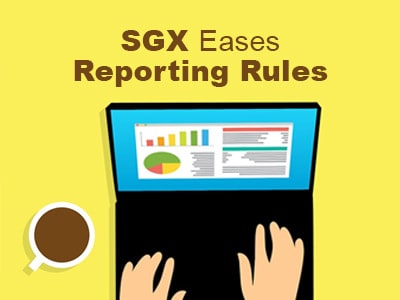SGX Reporting Rules Made Easier, but a Safeguard is in Place
Riskier Companies Now Subjected to Quarterly Compulsory Reporting

The Singapore Stock Exchange (SGX) is now making it easier for businesses to focus on their business’s long-term objectives. The new SGX reporting rules will save a lot of time and money. As part of the new change, businesses that exceed the $75 million thresholds no longer need to file earnings reports every 3-months.
The new changes are expected to roll out starting from 7 February 2020. It is still mandatory for all companies to disclose any pertinent information or changes that take place immediately. The SGX reporting rules change just means that the reporting is less frequent. Risky companies, however, will still be required to make the mandatory quarterly reporting. Risky companies include those that have been red-flagged by auditors.
Now, out of the 850 companies listed on the SGX, 600 need to file quarterly reports about their finances. Once the new SGX reporting rules are enforced, only 100 companies will need to do so. The eligible companies will be determined by the SGX Regulation (SGX RegCo).
Benefits of Changes in SGX Reporting Rules
As for the rest of the listed businesses, the new change is welcomed indeed. They will now only be required to file financial reports every 6-months instead. SGX RegCo acknowledges the international shift away from having to make quarterly reports.
However, safety is still a main concern and the SGX has ensured that a new safeguard will be in place along with the new changes. These safeguards are especially for companies classified as risky.
3E Accounting has welcomed this move by the SGX. The SBF has always believed that companies should not be overburdened so they can focus on creating value in their business.
Companies with multiple branches abroad will be pleased with the new SGX reporting rules. This is going to save them significant time as reporting quarterly for several countries creates a lot of hassle.
The new rules will still run a tight ship, though. Companies will still be required to disclose significant acquisitions. Major transactions of significance will also need to be independently valued. Since companies are now beginning to value and embrace transparency, they should not find the new changes too onerous.








